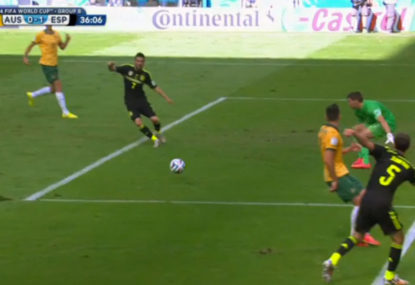Coming up with solutions to just about every puzzle posed at the World Cup so far, the Spain match was one conundrum too big for the Socceroos, eventually caving in 3-0 to the world champions.
Playing against a motivated and refreshed side that were keen to avoid a clean sweep, and missing a couple of key starters, the Roos were eventually pulled apart by the quality of Spain’s passing and protection of the ball.
It’s not that Ange Postecglou’s side didn’t have a crack or have a plan to stop the Spaniards. Indeed, in the opening 15 or 20 minutes of each half there was clearly a plan to be aggressive, press high and keep a high defensive line.
It forced the world champions into the type of errors we saw them commit against both the Netherlands and Chile, but have rarely seen over the past six or so years.
Even the great Andres Iniesta was being pressed and only getting touches facing his own goal, unable to turn or link and face the Australian goal, as he does so splendidly.
It was an excellent start from the Roos to both halves. In the first, it took Vincente del Bosque’s men 17 minutes to get it into their front third.
But eventually, in each half, Spain gained the ascendency, taking advantage of the poor distribution from the Australians to gain complete control.
While the Roos had an effective plan to disrupt the Spanish passing game, the plan on the ball wasn’t effective. There was one, but it wasn’t executed.
You could see in the opening 20 minutes that whenever skipper Mile Jedinak had the ball he looked up and out to the right, aiming to hit Mathew Leckie in space.
Given Leckie’s success during this tournament in one-on-one situations, it was an admirable strategy, but was let down by the skipper’s poor execution.
On no less than four or five occasions Jedinak missed his target when trying to release the ball into space for Leckie.
Not that Leckie had as much space as in the opening two games. Del Bosque had done his homework and the excellent Jordi Alba was always paying close attention.
Indeed, just as the Socceroos had planned so effectively against the Dutch, the Spanish had planned well against the Roos.
What they did was block off the outlet avenue of Jason Davidson down the left and instead let the Roos come out on the right, through Jedinak, Alex Wilkinson and Ryan McGowan.
They had clearly and correctly identified a weakness in Australia’s ability to play out on that side.
With Jedinak struggling to hit Leckie, the burden to create fell on Wilkinson and McGowan, and when they failed to deliver the requisite quality at this level, Spain pounced, looking for quicks balls in behind McGowan.
Del Bosque had brought in experienced A-League bound striker David Villa on the left, and he had a great final game for Spain, driving at and beyond McGowan, with and without the ball.
With the Socceroos’ distribution so poor, and the front third missing Tim Cahill’s hold-up play and Mark Bresciano’s poise, Spain took control, and suddenly the creators Iniesta and Santi Carzola started getting in between the lines.
The Roos’ rearguard was forced back by this rolling keep-ball model, and were being tested in every way, just as Postecoglou had suggested they would be in the build-up.
Unable to relieve any pressure by sustaining possession, the Roos eventually cracked under the relentless circulation and vertical runs in behind.
As ever, the orchestrator was Iniesta, playing Juanfran in behind Davidson to tee up the first for Villa, then spotting a static McGowan on the right and playing in Fernando Torres for the second.
Australia had started the second half well after Postecoglou moved Leckie to the number nine role and brought on Ben Halloran for the ineffective Adam Taggart, but again fell into the same trap of not cherishing the ball enough.
They also didn’t have the stamina to sustain the excellence of their pressing in the opening 15 minutes of each half.
The injuries to Mark Milligan, Bresciano and Ivan Franjic and the suspension of Cahill didn’t help, denying the Roos a settling hand or two at key moments. But even with their presence there would have been a wide gulf in quality.
It is a gap the Roos were able to bridge against Chile and the Dutch through organisation, athleticism and strong mentality, but the inability to keep the ball and create anything here chipped away at these very strengths.
As well, quite a few of the Roos went into their shell once the passes didn’t stick. It was a fear we hadn’t seen since the opening 20 minutes of the campaign.
Australia had hoped for a rousing conclusion to its Brazilian adventure, but this was one mountain too steep.
Still, given the circumstances when Postecoglou was brought in, it had been a spirited and stirring campaign from the Socceroos, featuring so many positives in the opening two games and opening 20 minutes of each half here.
Postecoglou has not only steadied the ship, but ensured we had a competitive team that took it to more storied opponents and garnered some respect back for the national team.





























































































